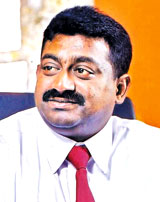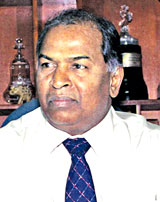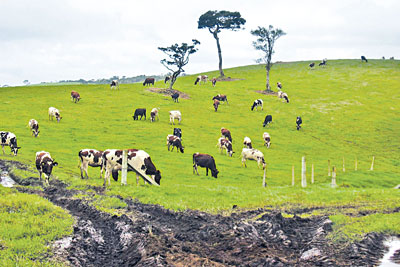|
Self-sufficiency in dairy milk mooted:
Sri Lanka - Dumping ground for surplus stock
by L.S. Ananda Wedaarachchi
 |
 |
|
Minister Arumugam Thondaman |
Maubima Lanka Chairman Ariyaseela Wickramanayaka |
Sri Lanka imports sixty-five percent of her milk food items worth
over three billion rupees annually. The government and various other
organisations introduced a number of programs to develop the milk
production in the country.
The government policy frame work, the “Mahinda Chintana Vision for
the future” gave the highest priority for the dairy products and live
stock development. It targeted to achieve 50 percent self-sufficiency in
milk products in 2015.
Milco-the government affiliated company and the main producer of
dairy products from locally produced milk decided last week, to effect a
10 percent increase in price to the local suppliers of milk. Meanwhile
imported milk powder prices have been increased by Rs. 48 per kilogram.
Milco decided to continue with its current prices as it depends solely
on local milk production.
A Milco spokesman said that they collect around 55-60 million litres
of milk annually from around 37,000 farmer families. Milco which
supplies nutritious dairy products to the consumers at a reasonable
prices has taken steps to improve the lot of the milk farmer community
through farmer management societies, he said.
Expansion of present farms, promotion of farmer families, renovation
of factories and higher prices for local farmers are few measures taken
by the Milco to develop the industry, he said.
 A spokesman for the Ministry of Livestock and Rural Community
Development said the number of milch cows in the country should be
doubled within a limited period enabling the production targets to be
achieved. The Central Bank recently introduced an eight percent low
interest loan scheme for dairy farmers. A spokesman for the Ministry of Livestock and Rural Community
Development said the number of milch cows in the country should be
doubled within a limited period enabling the production targets to be
achieved. The Central Bank recently introduced an eight percent low
interest loan scheme for dairy farmers.
A scheme to set up milk farmer villages in the agricultural districts
was also implemented, he said. The National Livestock Development Board
(NLDB) also implemented a liquid milk popularisation scheme and its
liquid milk sales outlets became very popular, he said.
Livestock and Rural Development Minister Arumugam Thondaman visited
Northern and Eastern Provinces last week to study the livestock industry
in those provinces.
The Minister hopes to develop the industry in collaboration with
private sector and Ministry of Animal Production and Health, he said.
The Cooperative Development Commissioner General V.P.G. Kithsiri said
that his Department had implemented a special programme through milk
cooperative societies numbering more than 300 islandwide for the
development of the industry.
There are four milk processing factories in Kurunegala, Kaduwela,
Hambantota and Hanguranketha, inaddition to the small and medium-scale
centres managed by the cooperative societies, he said.
Three deep freezors worth over 4.9 million each, were donated to
Sandaruwanketha, Ampara and Polonnaruwa milk collecting and processing
centres under a development program launched by the cooperative
Department, he said.
Leading industrialist and Maubima Lanka Chairman, Ariyaseela
Wickramanayaka said Sri Lanka took no meaningful steps in the past to
meet the country’s milk food requirements.
People who have vested interest with them use Sri Lanka as a dumping
ground for surplus milk powder products, of some western countries. If
Sri Lanka, Bangladesh or China turn down their good offer from such
countries they will be forced to throw them into the sea, Wickramanayaka
said.
Whenever the prices of imported milk foods go up in the market the
government in turn increases the price of liquid milk to boost local
milk production. However when the “heat” subsides within a short while
all plans and strategies which have an element of fantasy will die a
natural death.
This is what we did during the last two decades or so. At this rate
Sri Lanka will neither develop nor acquire self-sufficiency at all, he
said we have observed this pattern during the last 20 years. Sri Lanka
will however never develop or become self-sufficiency if we follow this
policy of self-defeatism.
According to the Central Bank Sri Lanka has 1.5 million cows, out of
which only 250,000 are milching, Sri Lanka produces only 35 percent of
its milk requirements while the remainder is imported at the cost of the
country’s valuable foreign exchange. Last year Sri Lanka spent more than
three billion rupees which is sufficient to built a new harbour, he
said.
With all the resources available to be self-sufficient in dairy
products, it is a crime to spend our resources to import milk powder.
All patriotic forces including media should act to put an end to these
antipatriotic practices and rebuild the country, he said. |

